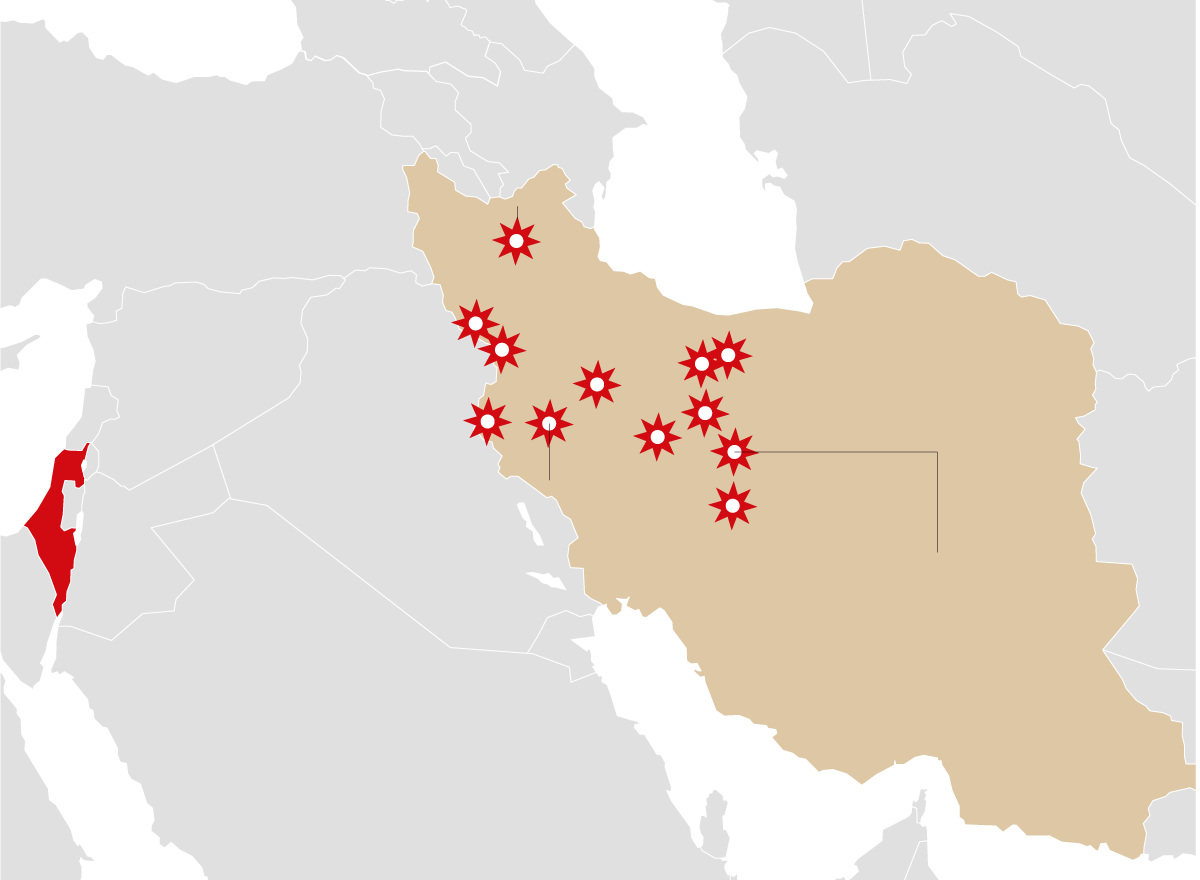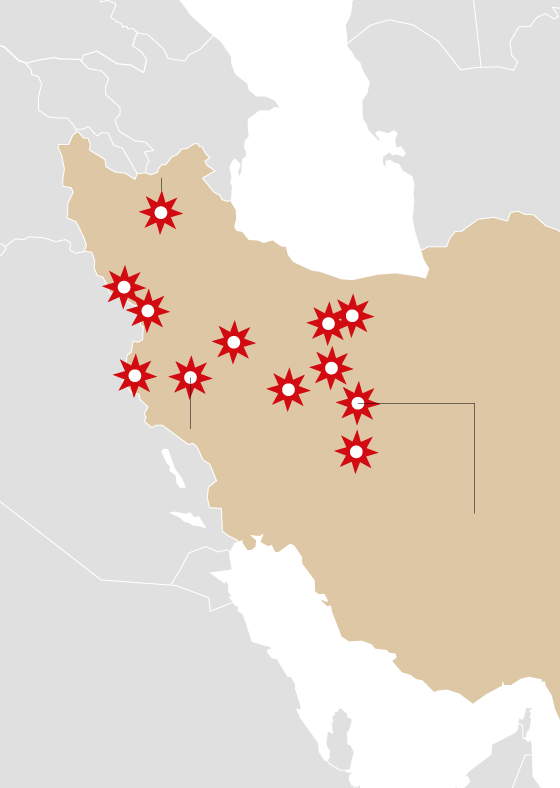Israel's attack on Iran puts the Middle East on the brink of regional war.
Among the victims are the head of the Revolutionary Guard and the chief of staff, and Tehran has responded with a wave of missiles.

Washington / BarcelonaIsrael launched an unprecedented attack against Iran on Friday, bombing nuclear and military facilities and killing senior officials and scientists responsible for its nuclear program. Benjamin Netanyahu's government has warned that "this is only the beginning" and has brought the Middle East one step closer to a full-scale regional war. Iran responded with two waves of ballistic missiles that overcame Iron Dome, Israel's air defense system, and hit Tel Aviv. Supreme Leader Ali Khamenei considered the Israeli attack a declaration of war and vowed "not to leave these crimes unpunished."
The first Israeli bombings began in the early hours of the morning, causing panic in Iran. "We woke up scared at three o'clock because of the noise and saw the fire and smoke coming out of the building across the street." When Masha (not her real name) and her family left their house early this morning in Tehran, they saw that the apartment building across the street had already been bombed. "Us adults recognized the sound of the Israeli bombs; we remembered them from the war. But the younger ones, like my nephews, didn't know what was happening," she explains to ARA.
Among the victims are the head of the Revolutionary Guard, Hossein SalamiThe army chief of staff, Mohamed Bagheri, and two of the top officials in charge of the nuclear program, according to Iranian state television. Also present is Masha's neighbor, an advisor to Ali Shamkhani, a confidant of Ayatollah Ali Khamenei. Like most officials, he lived in the Kamraniyeh neighborhood in the north of the city, in a "very tall and luxurious" tower, and of the entire building, Israeli artillery destroyed only his floor.
The explosions echoed throughout the city, and Masha and her family saw, from their home, the flashes of several projectile impacts. "There were many ambulances, and when the police arrived, there were many people helping the wounded." They didn't receive any alerts on their cell phones until midday, while the bombing was still going on. The Iranian authorities—who had previously blocked mobile apps like WhatsApp and Instagram to make it difficult to access information—were warning people about the situation and recommending they stay indoors. However, Masha says, there was a general sense of satisfaction.
Despite the fear of attacks, many Iranians welcomed the deaths of senior army commanders who had carried out a harsh crackdown on the population. "People have long suffered from the executions of young people by the authorities. They always do it at 3:00 a.m. And the fact that they killed them at that hour, we saw it as a form of revenge."
According to military sources and defense analysts, the attack was carried out in seven coordinated waves, involving more than 200 combat aircraft, combining military, nuclear, and high-value symbolic and strategic targets. One of the main targets was the central Iranian city of Esfahan, home to Natanz, Iran's main uranium enrichment plant. The head of the International Atomic Energy Agency (IAEA), Rafael Grossi, informed the UN Security Council last night that the above-ground part of the plant "that produced 60 percent enriched uranium has been destroyed" and that "there is no evidence of attacks on the underground part, but that those in the center. Grossi reiterated that nuclear facilities should not be attacked and said that the risk of contamination is manageable with the plant's capabilities.
The first attacks were carried out with F-35 aircraft, equipped with low radar detection technology, with the aim of neutralizing anti-aircraft defense systems such as the S-300, of Russian origin. Subsequently, F-15 and F-16 aircraft have launched cruise missiles from long distance, following a strategy of minimum risk for the pilots and maximum precision on the targets. In western Iran, near the border with Iraq, military installations such as those in Kermanshah and Khorramabad, linked to Iranian ballistic missile capabilities. The goal is believed to hamper the production of solid-fuel missiles, which rely on chemical components imported from North Korea and China. Iranian media reported an initial death toll of 78 dead and 329 wounded. Israeli attacks continued throughout the day, including the northwestern city of Tabriz, home to a major air base.
After launching a wave of drones mid-morning, Iran bombarded Israel with two waves of ballistic missiles in the evening. According to the Israeli military, nearly 100 missiles reached Israeli airspace, most of which were shot down or deflected. Emergency services estimate the initial death toll at 40 wounded (two of them critical).
A "declaration of war"
Iran has called Israel's attack a "declaration of war." Iran's Supreme Leader, Ayatollah Ali Khamenei, stated that the attacks reveal Israel's "vile nature," and that with this attack, Israel "has earned a bitter fate, which it will certainly receive." "The armed forces will undoubtedly respond to this Zionist attack," said Iranian spokesman Abolfazl Shekarchi. In addition, Iranian President Masoud Pezeshkian also promised a "legitimate and powerful response" against Israel. The regime has claimed to have shot down two Israeli planes and captured one of the pilots.
Ayatollah Khamenei announced this morning that he has replaced the two deceased senior military commanders. According to Iranian state television, General Abdolrahim Mousavi—who was until now the army's chief commander—has been appointed the new head of the armed forces, replacing General Mohamed Bagheri. Instead, Mohamed Pakpour will take over as leader of the Revolutionary Guard, replacing General Hossein Salami.
Donald Trump threatens Iran with "more brutal attacks"
The United States has denied involvement in the attack. However, the US president described the attacks as "successful" and claimed that Israel had used "significant military hardware" manufactured in the United States. He also took the opportunity to demand that Tehran return to the negotiating table to "reach an agreement" on its nuclear program if it wants to avoid "further attacks, already planned and even more brutal, from happening." "There is still time to end this massacre," the tycoon stated. During the evening, US military commanders confirmed that the United States had contributed to shooting down some of the missiles launched from Iran at Israel.
The Israeli attack occurred while Washington and Tehran They met to negotiate a nuclear agreement to prevent Iran from obtaining a nuclear bomb. Just this Thursday, the IAEA issued an alert accusing Tehran of violating its nuclear nonproliferation obligations. Trump also confirmed that his administration contacted a key Middle Eastern ally before the attack to inform them of what was about to happen.
Diplomatic Attempts
Last year Iran Israel has already attacked in response to a Tel Aviv strike against the Iranian consulate in Damascus. Ultimately, a wider escalation was averted. Now, the Israeli strike and the Iranian response threaten to ignite the powder keg that the Middle East has become, particularly since the start of the Gaza war.
French President Emmanuel Macron has said that his country will participate in Israel's defense, while Russian President Vladimir Putin spoke by phone with his Iranian counterpart to condemn the attack on Tehran and also with Netanyahu, telling him that the dispute over Iran's nuclear program is only...
European Foreign Minister Kaja Kallas has called on Israel and Iran to "exercise restraint" and "avoid further escalation" of the conflict. "Diplomacy remains the best way forward, and I am ready to support any diplomatic effort for de-escalation," the European Union leader tweeted, calling the situation "dangerous."
From Downing Street, British Prime Minister Keir Starmer called for restraint on both sides. "Escalation serves no one in the region. Stability in the Middle East must be the priority, and we urge partners to de-escalate the situation. This is a time for restraint, calm, and a return to diplomacy." But the truth is that neither Gaza nor the rest of the region live by these rules anymore.
Arab countries, although Iran is one of their great regional rivals, have also condemned the Israeli attack. Qatari Prime Minister Mohammed bin Abdulrahman bin Jasim al-Thani has warned that Israel's "absurd actions" continue to destroy the prospect of peace in the region and pose "an imminent threat to global security." The United Arab Emirates has called for "maximum restraint and rationality." Egypt has warned of "unprecedented repercussions for the security and stability of the Middle East."
The Israeli attacks are a severe blow to Iran's military leadership and the development of its nuclear program.
-
General Mohamed Bagheri
He was the chief of staff of the Iranian armed forces, the second-highest-ranking commander after Supreme Leader Ayatollah Ali Khamenei.
-
General Hossein Salami
He was the commander-in-chief of the Islamic Revolutionary Guard Corps, Iran's main military force.
-
General Gholamali Rashid
Rashid was the head of the Khatam al-Anbia headquarters of Iran's Revolutionary Guard. He previously served as deputy chief of staff of the Iranian Armed Forces and fought for Iran during the 1980s war against Iraq.
-
Ali Shamkhani
He was a close associate of Iran's Supreme Leader Ayatollah Ali Khamenei, a prominent diplomatic figure in the country who, for example, had represented Tehran in the talks that led to the restoration of diplomatic relations with Saudi Arabia.
Shamkhani served as the country's top national security official from 2013 to 2023, holding senior positions in the Revolutionary Guard and the Ministry of Defense.
-
Amir Ali Hajizadeh
General Hajizadeh was the commander of the Iranian Revolutionary Guard Air Force and headed Iran's missile program, thus being ultimately responsible for defending the country's airspace. Furthermore, Hajizadeh masterminded Iran's previous attack on Israel in April 2024.
-
Fereydoun Abbasi-Davani
Nuclear scientist Fereydoun Abbasi-Davani was head of the Atomic Energy Organization of Iran from 2011 to 2013. A hardliner, he served in parliament from 2020 to 2024.
-
Mohamed Mehdi Tehranchi
This theoretical physicist was director of the Islamic Azad University of Iran, in Tehran.



